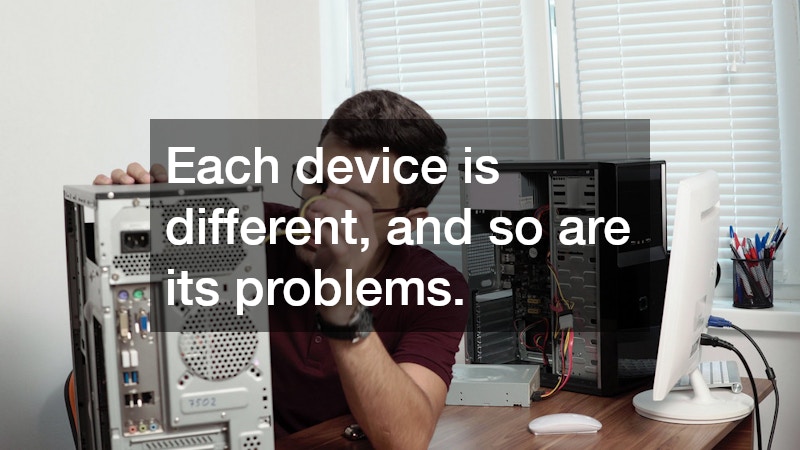
When it comes to computer repairs, there’s a lot of misinformation floating around. Whether you’ve heard it from a friend, seen it in an online forum or picked it up from old habits, many myths about fixing computers can lead to poor decisions and unnecessary expenses.
Understanding what’s fact and what’s fiction is essential if you want to protect your device and avoid wasting time or money.
Technology has advanced quickly, but some outdated ideas have stuck around. These misconceptions can not only make problems worse but also stop people from seeking professional help when they need it. In this article, we’ll explore three common myths about computer repairs and explain why they don’t hold up in today’s tech world.
Myth 1: You Should Always Try to Fix It Yourself
One of the most widespread myths is that all computer issues can be solved at home with a quick internet search and a bit of trial and error. While it’s true that some minor problems—like closing a frozen program or deleting unnecessary files—can be handled on your own, not every issue should be treated as a DIY project.
Modern computers are complex machines with delicate internal parts and software systems. A simple mistake, such as removing the wrong file or damaging a connector while opening the case, can lead to bigger problems. Trying to repair your device without the right tools or knowledge can void warranties, corrupt important data or make a fix much more expensive than it would have been.
Professional technicians have the training and equipment to diagnose and resolve problems accurately and safely. Whether it’s a hardware failure, malware infection or operating system glitch, it’s usually worth getting an expert opinion before attempting your solution.
Myth 2: If Your Computer Is Slow, You Need a New One
Another myth that leads people to spend more than necessary is the belief that a slow computer means it’s time for a replacement. While it’s frustrating to deal with lagging programs and long startup times, these symptoms don’t always mean your computer is at the end of its life.
In many cases, computer repairs can breathe new life into your current system. Slow performance might be caused by software issues like malware, too many background programs or a cluttered hard drive. These can usually be fixed with a tune-up, virus removal or memory upgrade. Even hardware upgrades—such as replacing an old hard drive with a solid-state drive (SSD) or adding more RAM—can significantly boost speed without the need for a new device.
It’s also worth noting that newer isn’t always better if you only use your computer for basic tasks like email, web browsing or word processing. A few adjustments can extend the life of your current machine and save you hundreds of dollars. A trusted technician can help assess whether repairs or upgrades are the better option for your needs.
Myth 3: Computer Repairs Always Cost Too Much
Some people avoid getting professional help because they believe that computer repairs are too expensive to be worth it. While certain repairs—like motherboard replacements or data recovery—can be pricey, many common fixes are affordable, especially compared to the cost of a brand-new computer.
Issues like virus removal, screen replacements, software installation or hard drive upgrades are often completed for a reasonable fee, especially when caught early. Repair shops typically offer upfront quotes and only proceed with your approval, so there’s no surprise when it comes time to pay.
It’s also important to consider the value of your data. Photos, documents, and important files can be irreplaceable. Even if your computer seems beyond repair, professionals may be able to recover your data or transfer it to a new device. In this case, the cost of repair can be well worth it when you factor in the value of lost files and the time saved.
If you’re worried about price, it never hurts to get a quote or a second opinion. Many technicians offer diagnostics or consultations for free or a small fee. Comparing repair costs to the price of replacing a computer makes it easier to make an informed decision.
Why It’s Important to Get the Facts
Misinformation about computer repairs can lead to unnecessary purchases, wasted time and further damage to your device. Believing these myths may cause you to delay needed repairs or attempt fixes that make things worse. In some cases, people throw away perfectly good machines due to problems that could be solved in under an hour.
Getting accurate advice from a qualified technician or trusted source can help you make smarter decisions about your technology. You’ll avoid falling into common traps, and you’ll understand when a problem can be solved with a simple adjustment or when it’s time to consider replacement.
In summary, computer repairs aren’t always expensive, unnecessary or beyond your control. Don’t be fooled by outdated advice or general assumptions. Each device is different, and so are its problems. Taking the time to separate fact from fiction will help you maintain your computer more effectively, save money and get the most out of your investment.

 Environmental Practices Among Modern Steel Manufacturers
Environmental Practices Among Modern Steel Manufacturers  Protecting Your Data During Laptop Repair Service
Protecting Your Data During Laptop Repair Service  How Advantageous Could Vehicle Ad Wrapping be for Your Business?
How Advantageous Could Vehicle Ad Wrapping be for Your Business?